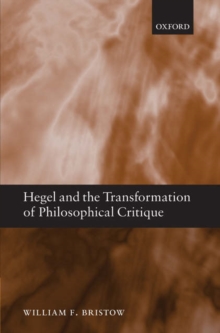Description
| Product ID: | 9780199290642 |
| Product Form: | Hardback |
| Country of Manufacture: | GB |
| Title: | Hegel and the Transformation of Philosophical Critique |
| Authors: | Author: William F. Bristow |
| Page Count: | 272 |
| Subjects: | Western philosophy from c 1800, Western philosophy, from c 1900 -, Philosophy: epistemology and theory of knowledge, Philosophy: epistemology & theory of knowledge |
| Description: | Select Guide Rating William F. Bristow presents an original and illuminating study of Hegel's hugely influential but notoriously difficult Phenomenology of Spirit (1807), one of the great works of modern philosophy. In particular Bristow shows that a proper understanding of this work must be founded on an understanding of its relationship to Kant's Critique of Pure Reason (1781). William F. Bristow presents an original and illuminating study of Hegel''s hugely influential but notoriously difficult Phenomenology of Spirit. Hegel describes the method of this work as a ''way of despair'', meaning thereby that the reader who undertakes its inquiry must be open to the experience of self-loss through it. Whereas the existential dimension of Hegel''s work has often been either ignored or regarded as romantic ornamentation, Bristow argues that it belongs centrally to Hegel''s attempt to fulfil a demanding epistemological ambition. With his Critique of Pure Reason, Kant expressed a new epistemological demand with respect to rational knowledge and presented a new method for meeting this demand. Bristow reconstructs Hegel''s objection to Kant''s Critical Philosophy, according to which Kant''s way of meeting the epistemological demand of philosophical critique presupposes subjectivism, that is, presupposes the restriction of our knowledge to things as they are merely for us. Whereas Hegel in his early Jena writings rejects Kant''s critical project altogether on this basis, he comes to see that the epistemological demand expressed in Kant''s project must be met. Bristow argues that Hegel''s method in the Phenomenology of Spirit takes shape as his attempt to meet the epistemological demand of Kantian critique without presupposing subjectivism. The key to Hegel''s transformation of Kant''s critical procedure, by virtue of which subjectivism is to be avoided, is precisely the existential or self-transformational dimension of Hegel''s criticism, the openness of the criticizing subject to being transformed through the epistemological procedure. |
| Imprint Name: | Oxford University Press |
| Publisher Name: | Oxford University Press |
| Country of Publication: | GB |
| Publishing Date: | 2007-01-25 |
